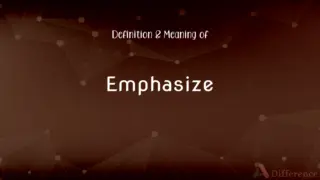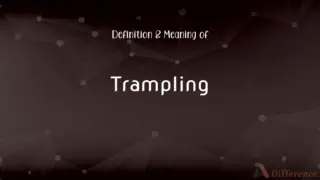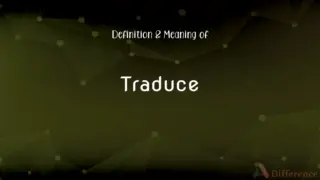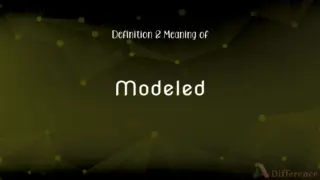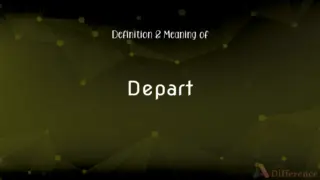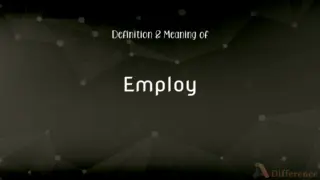Pour Definition and Meaning
Edited by Tayyaba Rehman — By Maham Liaqat — Updated on March 6, 2024
Pour means to flow or cause to flow in a steady stream from or into a container or place. e.g., She poured milk into the glass carefully.
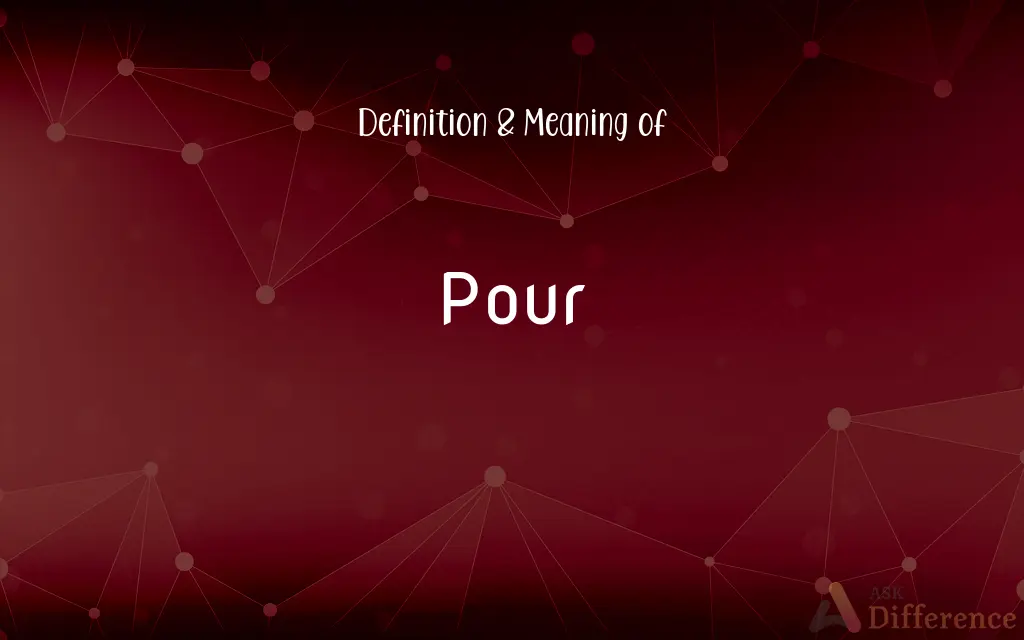
Table of Contents
Pour Definitions
To express one's thoughts or feelings freely.
She poured out her heart in the letter.
To serve a drink by flowing it into a glass or cup.
The bartender poured a beer for the customer.
To distribute or dispense freely.
Volunteers poured soup for the homeless.
To allocate or bestow something in generous or large amounts.
The teacher poured praise on the successful students.
To cause liquid to flow from a container.
He poured water into the kettle.
To rain heavily.
It's pouring outside; don't forget your umbrella.
To cause to move or come forth in large quantities.
Light poured through the open windows.
To come or go in large numbers or amounts.
Fans poured into the stadium for the concert.
To invest or devote resources or efforts liberally.
The company poured millions into the new project.
To cause (a liquid or granular solid) to stream or flow, as from a container
Poured tea from the pot into the cup.
To pour a liquid or particles into (a container)
Poured a glass of milk.
To empty (a container) of a liquid or granular solid
Poured a bucket of sand on the ground.
To send forth, produce, express, or utter copiously, as if in a stream or flood
Poured money into the project.
Poured out my inner thoughts.
To stream or flow continuously or profusely
Water poured over the dam.
To rain hard or heavily
It has been pouring for an hour.
To pass or proceed in large numbers or quantity
Students poured into the auditorium.
To serve a beverage, such as tea or coffee, to a gathering
We need someone to pour.
A pouring or flowing forth, especially a downpour of rain.
(transitive) To cause (liquid, or liquid-like substance) to flow in a stream, either out of a container or into it.
Pour water from a jug
Pour wine into a decanter
To pour oil onto chips
To pour out sand or dust.
To send out as in a stream or a flood; to cause (an emotion) to come out; to cause to escape.
My teacher poured scorn on my attempts at writing.
(transitive) To send forth from, as in a stream; to discharge uninterruptedly.
(intransitive) To flow, pass or issue in a stream; to fall continuously and abundantly.
The rain poured down.
(impersonal) To rain hard.
It's pouring outside.
(intransitive) Of a beverage, to be on tap or otherwise available for serving to customers.
(intransitive) To move in a throng, as a crowd.
The people poured out of the theater.
The act of pouring.
The bartender's inexpert pour left me with a pint of beer that was half foam.
Something, or an amount, poured.
(colloquial) A downpour, or flood of precipitation.
Poor.
To pore.
To cause to flow in a stream, as a liquid or anything flowing like a liquid, either out of a vessel or into it; as, to pour water from a pail; to pour wine into a decanter; to pour oil upon the waters; to pour out sand or dust.
To send forth as in a stream or a flood; to emit; to let escape freely or wholly.
I . . . have poured out my soul before the Lord.
Now will I shortly pour out my fury upon thee.
London doth pour out her citizens !
Wherefore did Nature pour her bounties forthWith such a full and unwithdrawing hand ?
To send forth from, as in a stream; to discharge uninterruptedly.
Is it for thee the linnet pours his throat ?
To flow, pass, or issue in a stream, or as a stream; to fall continuously and abundantly; as, the rain pours; the people poured out of the theater.
In the rude throng pour on with furious pace.
A stream, or something like a stream; a flood.
Cause to run;
Pour water over the floor
Move in large numbers;
People were pouring out of the theater
Beggars pullulated in the plaza
Pour out;
The sommelier decanted the wines
Flow in a spurt;
Water poured all over the floor
Supply in large amounts or quantities;
We poured money into the education of our children
Rain heavily;
Put on your rain coat-- it's pouring outside!
To flow rapidly in a steady stream.
Rain began to pour down heavily.
Pour Snonyms
Stream
To flow in a continuous current in a specified direction.
Tears streamed down her cheeks.
Discharge
To allow (a liquid, gas, or other substance) to flow out from where it has been confined.
The factory was fined for discharging waste into the river.
Drizzle
To rain lightly in very small drops.
It began to drizzle, so we opened our umbrellas.
Decant
To gradually pour (liquid, typically wine or a solution) from one container into another, especially without disturbing the sediment.
He decanted the vintage wine carefully.
Spill
To cause or allow (liquid) to flow over the edge of its container, especially unintentionally.
She spilled some coffee on the table.
Cascade
To pour downward rapidly and in large quantities.
Water cascaded over the cliff's edge.
Drip
To let fall in drops.
The faucet dripped all night.
Release
To allow (a substance) to flow out from where it is confined.
The dam released a huge volume of water.
Emit
To discharge (fluid, especially when not in streams).
The machine emits a small amount of liquid.
Transfuse
To pour from one container into another, especially by means of a siphon or a similar device.
Blood was transfused from the donor bag into the patient.
Pour Idioms & Phrases
Pour salt on the wound
To make a difficult situation even worse.
Bringing up past failures just pours salt on the wound.
It never rains but it pours
Problems or difficulties tend to follow each other in rapid succession.
First the car broke down, then the roof leaked; it never rains but it pours.
Pour your heart out
To express your emotions freely and openly.
She poured her heart out to her friend about her struggles.
Pour oil on troubled waters
To try to calm a difficult situation.
The mediator poured oil on troubled waters during the negotiations.
Pour cold water on
To discourage or dampen enthusiasm.
He poured cold water on their plans by highlighting the risks.
Pour forth
To emerge in large numbers.
Ideas began to pour forth during the brainstorming session.
Pour it on thick
To exaggerate or overemphasize.
He poured it on thick with his excuses, hoping to avoid punishment.
Pour money down the drain
To waste money.
Investing in that failing business is like pouring money down the drain.
Pour out one's soul
Similar to pouring your heart out, sharing deep emotions.
In her diary, she poured out her soul.
Make it pour
To cause a situation to become more intense.
The surprise announcement made it pour in terms of public reaction.
Pour one's energies into
To devote a lot of effort to something.
She poured her energies into her art.
Pour the coals on
To increase the intensity or speed.
In the final lap, he poured the coals on and won the race.
Pour over
To study something carefully.
She poured over the ancient texts for hours.
Pour through
To arrive or move in large numbers.
Applications poured through the moment the job was posted.
Pour gasoline on the fire
To make a situation worse.
Arguing about politics at family gatherings just pours gasoline on the fire.
Pour one out
To spill some of a drink on the ground as a way of showing respect for someone who has died.
Let's pour one out for our friend who couldn't be here today.
Pour scorn on
To express contempt or derision.
Critics poured scorn on the director's latest film.
Pour into
To invest in something.
They poured into the stock market at the right time.
Pour Example Sentences
During the ceremony, they will pour sand into a vase to symbolize their unity.
The rain began to pour down heavily, making it difficult to see the road.
Carefully pour the mixture into the baking pan.
As the lecture continued, he began to pour over his notes, trying to understand the material.
She decided to pour herself a cup of tea to relax.
As the story unfolded, she couldn't help but pour out her emotions.
He loves to pour his creativity into every painting he makes.
The chef demonstrated how to pour the batter into the pan evenly.
The volunteers helped to pour soup for the homeless at the shelter.
They gathered to pour libations in honor of their ancestors.
The company decided to pour more resources into research and development.
As the concert ended, applause began to pour from the audience.
She took a moment to pour over the old photographs, reminiscing about the past.
The foundation decided to pour funds into the community project.
Every morning, he would pour water on the plants in his garden.
The fans began to pour into the stadium, eager for the game to start.
Common Curiosities
What is a stressed syllable in pour?
Since pour is a single syllable word, the entire word is stressed.
Why is it called pour?
It's called pour from the Old French 'purer', meaning to sift or filter, which evolved to mean causing liquid to flow.
How many syllables are in pour?
There is one syllable in pour.
How do we divide pour into syllables?
Pour is a single syllable word and is not divided.
How is pour used in a sentence?
Pour is used to describe the action of causing liquid to flow, e.g., Please pour some water for the guests.
What is the second form of pour?
The second form of pour is poured (past simple).
What part of speech is pour?
Pour is a verb.
What is the singular form of pour?
Pour does not have a singular or plural form; it remains the same as it is a verb.
What is the pronunciation of pour?
Pour is pronounced as /pɔːr/ in British English and /pɔr/ in American English.
What is the root word of pour?
The root of pour is from the Old French word 'purer', which means to sift or filter.
What is the first form of pour?
The first form of pour is pour (base form).
What is another term for pour?
Another term for pour is dispense.
Is pour an abstract noun?
No, pour is a verb, and when used as a noun, it refers to an action or instance of pouring, which is concrete.
What is the verb form of pour?
Pour is itself a verb in its base form.
What is the third form of pour?
The third form of pour is poured (past participle).
Is pour a noun or adjective?
Pour is primarily a verb, but it can be used as a noun in specific contexts, such as "a pour of concrete."
Is pour a negative or positive word?
Pour is generally neutral, but its connotation can vary depending on context (e.g., pouring rain might be negative, but pouring a drink could be positive).
Is pour a countable noun?
When used as a noun, pour can be countable in specific contexts, such as referring to individual acts of pouring.
Is the word “pour” a Direct object or an Indirect object?
Pour can serve as a verb where the action is performed upon a direct object, e.g., "Pour the milk into the glass."
What is the plural form of pour?
Pour does not have a plural form as it is a verb.
Is pour a vowel or consonant?
The word pour starts with a consonant.
Is the word pour Gerund?
The gerund form of pour is pouring.
Which conjunction is used with pour?
Conjunctions like "and" or "but" can be used with pour to connect ideas, e.g., "pour and stir" or "pour but do not spill."
Which article is used with pour?
The indefinite article "a" is used with pour when it functions as a noun, e.g., "a pour of concrete," but as a verb, it does not take an article directly.
What is the opposite of pour?
The opposite of pour could be drain or withhold.
Is pour an adverb?
No, pour is not an adverb.
Is pour a collective noun?
No, pour is not a collective noun.
Is the pour term a metaphor?
Pour can be used metaphorically, as in "ideas poured in," to describe something happening in large quantities or intensively.
Which determiner is used with pour?
Determiners such as "a" or "the" can be used with pour when it's used as a noun, e.g., "after a pour of rain" or "the pour was smooth."
Which preposition is used with pour?
Prepositions like "into," "over," or "from" can be used with pour, depending on the context, e.g., "pour into a container," "pour over pancakes," or "pour from a jug."
Is the word pour imperative?
Pour can be used in the imperative mood when giving commands, e.g., "Pour the sauce over the pasta."
Which vowel is used before pour?
The vowel "a" can be used before pour in phrases like "take a pour," when pour is used as a noun.
Share Your Discovery
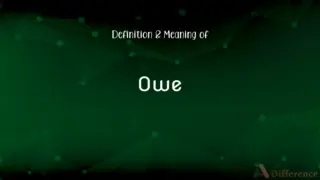
Previous Term
Owe Definition and Meaning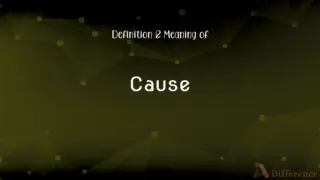
Next Term
Cause Definition and MeaningAuthor Spotlight
Written by
Maham LiaqatEdited by
Tayyaba RehmanTayyaba Rehman is a distinguished writer, currently serving as a primary contributor to askdifference.com. As a researcher in semantics and etymology, Tayyaba's passion for the complexity of languages and their distinctions has found a perfect home on the platform. Tayyaba delves into the intricacies of language, distinguishing between commonly confused words and phrases, thereby providing clarity for readers worldwide.







